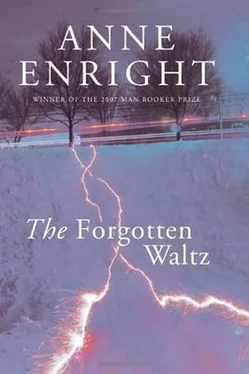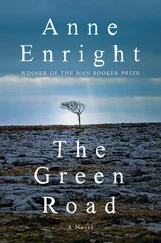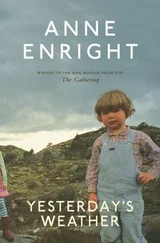So he went back into town and swapped the pink bed linen for some with a chopped fruit design in acid-yellow and lime-green. He bought a lime-coloured dressing gown with purple trim, and oversized slippers with doggy faces on the toes.
He bought an iPod dock in the shape of a plastic pig and a little white chest of drawers to put it on. He bought a fish bowl and a goldfish, in a clear plastic bag. I said, ‘Who is going to feed the fish?’
‘I will,’ he said.
He gave it to me for a moment, and I held it up to the light. An orange fish, darting and stopping in its bright bubble of water.
Happiness in a bag.
Seán fed it for at least a month, every second day, faithfully, then one evening, I got a text: ‘check fish!!!!!!!!!!!’
So I feed it now, and it is still alive. A fish called Scratch. You can hear it when the house is still – actually hear it – nose down, picking up stones, sorting through the gravel. The first time she stayed over, Evie said the sound of it kept her awake all night, it was the noisiest fish on the planet.
Even Scratch is quiet, tonight. It has started to snow again and the tyre-welts on the street are softening into humps and mounds of white. The traffic lights work on. Upstairs, at the end of the landing, Evie’s room is a padded shrine of lime-green and acid-yellow, with pips, in the watermelon smiles of blood red. Her clothes, in the little white chest of drawers, tend more to black as the months pass, with rips in the right places, and skulls, and scrag-ends of tulle. Her father lets her wear what she likes. He talked about a carpet, so her sequinned hi-tops would have something to look good on, while she is away. It is like he has forgotten where he is.
‘A new carpet?’ I said.
‘Maybe a rug.’
So I hoover the rug.
I did not pay for the rug.
I nearly paid for it, mind you – that woman is bleeding him dry.
The rug has big coloured squares on it. It looks great. And I am not complaining. When it comes to housework, Seán is a clean sort. You don’t catch him at it, but after he has been through, the place is brighter, neater. His laundry tablets may glow in the dark, but they make my clothes smell like sunshine itself.
He is asleep now, wherever he is. He is dreaming figures, calculations, presentations: he is dreaming about rooms. There are women in those rooms, but do not ask him, when he wakes, which women they are.
‘I never dream about people I know. Rarely,’ he says.
I close the lid of my laptop and listen. There is a sound in the house – a sound like the fish, but it is not the fish. Something tiny.
I go through the rooms downstairs, but the noise seems to move about as I try to follow it. I pull up cushions from the sofa, and listen at the chimney breast. I go out and head up the stairs, only to pause before I reach the landing. It is somewhere between the top of the stairs and the bottom of the stairs. I go up and then down. I turn and turn about. I stand still and listen.
Finally, in a rush, I pull Seán’s gym bag out from the cupboard under the stairs. His kit is in the wash, but his trainers are still in there, also a toilet bag, and a loose tin of talc. I drag on some neon-green wires until the headset of his iPod comes into view. It is one of those jogging headsets, with a stiff band that rests on the back of your neck; the kind that looks a bit stupid even if you are actually jogging. It takes me a moment to pull the thing free. The music seems so small and frantic, locked up in there. I put one of the buds to my ear, the band twisting against my cheek, and I hear it open up, a whole cathedral of sound.
‘Listen to this,’ he said one night. ‘Listen to this!’ slotting the iPod into Evie’s plastic-pig speaker dock; some smiling diva on the display, and a voice – once you got over the swoop and posh of it – singing something no one should be asked to understand.
There she is again, dangling at the other end of the luminous wire. The ‘Four Last Songs’ with Elizabeth Schwarzkopf. Surely he wasn’t pounding the treadmill to the ‘Four Last Songs’? I sit on the floor and listen for another while, before switching the thing off and throwing it back into the staleness of the gym bag. I do not linger. I do not unzip the side pockets, or check his toiletries, or lift the rectangular base of the bag to see if there is a condom under there, long forgotten, or freshly stashed. I just pause the iPod and push the lot back under the stairs.
That is how quiet Dublin is, on this night of snow.
My father listening to classical music in the dining room; his papers in piles on the polished table, the sunset making the room thick with colour. The beauty of it.
Don’t annoy your father now .
My father sitting in the chair, eyes closed, one arm hanging by his side; dead, or asleep. Passionately dead. Passionately asleep. Or maybe he was just out of it. What was the music?
Ravel’s Boléro .
Ah. The nineteen-eighties.
I get to my feet and he is behind me as I turn, talking into the phone, smoking into the old-fashioned cold of the hall. He spent his life out here, conducting cheery conversations about nothing you could put a finger on. We used to listen, myself and Fiona, to see if he would say something we could understand; a word like ‘money’ or ‘intestate’ or even ‘county council’, but he could go twenty minutes straight without nouns, or names, or anything you could stick a meaning to. ‘That’s the way of it,’ he said, or, ‘Well, he would, wouldn’t he,’ along with much chortling of a professional nature. All the time playing some deliberate game with the lighted cigarette that was in his hand, laying it with precision at the edge of the table, then nosing it along, to keep the burning tip ahead of the wood.
‘Indeed, you might say that. Ha ha. You might.’
And later, in the dining room, when the music could not hold him, I remember our father getting agitated at the dusk, turning to the window over and over as if to ask, What is happening to the light? Like a dog during a solar eclipse, my mother said. This was in his last illness. He had some funny bile thing that affected his liver and the toxins in his blood caused a quick kind of havoc in his brain. The world refused to make sense to him, even as it turned. It took us a while to notice – dementia gave my father a bluff and paranoid air. He became more hearty, and trusted no one. It was just as he had always suspected .
One afternoon I came back from the swimming pool in Terenure College with my hair wet. There must have been boys there; something about me that looked like guilt.
‘Why is that one wet?’ he said, and he looked to Fiona, like I was the greatest eejit.
‘She went for a swim, Daddy.’
‘A swim?’
It was hard to know what part of the sentence he did not understand; whether he had forgotten about swimming, or forgotten about water, or forgotten, indeed, about wetness. But he did not forget, not to the very end, how to pitch one human being against the other. That he could do when all else was lost to him.
‘A woman should be very beautiful or very interesting,’ he used to say, when he was well. ‘And you, my dear, are madly interesting.’
Pronounced ‘medley’, in that lush, Irish camp he liked to affect when he delivered his bon mots. Fiona, of course, was medley beautiful.
Neither did he forget how to drink. Fiona would dispute this, but I have the clearest memory of us both walking down to the hospice on Harold’s Cross Road with a naggin of gin that we had bought for him in the off-licence before the park. We had saved our pocket money for it.
He was sitting up in the bed when we found his room, but he did not know who we were. He said to Fiona, ‘Who are you? Why are you kissing me?’ But he still remembered the difference between vodka and gin – it was supposed to look like water, we knew that much, but it seems we got the wrong one – he spat it back into the tooth mug, and said, ‘What do you call this?’
Читать дальше












